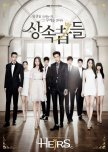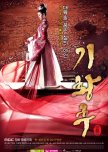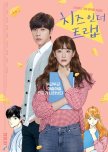
The story is full of clichés, some of them infuriatingly abundant in other kdramas as well: rich boy/poor girl, bad boy/good girl, lots of wrist-grabbing and bullying, love against the odds, family issues... yada, yada. It falls apart at times; I couldn't quite figure out why things kept happening in the most painful way for our protagonists - other than, of course, the fact that the show must go on for 20 episodes - since there seemed to be just drama for the sake of drama. I still ate it up like a fool, though: glued to my screen, waiting to see what other plight would befall our poor duo. Sugar cravings, anyone?
The acting is adequate: as many other reviewers have observed, the supporting cast shines through the main characters' bickering. I especially enjoyed Kang Ha Neul and Kang Min Hyuk, who were incidentally two of the least problematic characters in the show. I can't say that Lee Min Ho or Park Shin Hye were bad - they just weren't anything special. (Besides, as far as I'm concerned, nobody can shine through their role if they're dressed like LMH was. Good grief, first the animal prints of City Hunter, and now those tacky dress shirts and fugly sweaters.)
The fact is, I don't believe anyone's role was well fleshed out. The "love triangle" is an archetypical one; the heroine, while showing some pleasant spazz in the beginning, is later being thrown around like a tennis ball; the male protagonist grabs the heroine from the wrist and is rather insistent she obey and follow him around (and she listens!); the third corner of our triangle is the "bad boy" of the group, being shown as a rather despicable human being but having a change of heart midway. In this role, Kim Woo Bin actually did a very good job. I loved to hate him, and although it is clearly shown he can't be forgiven for his shitty behavior, he repents and grows as a character. All the supporting actors had a story of their own, and I could sympathise with them, but it was never shown as much as I wanted; just inferred.
Since, as I said, I literally devoured the episodes one after another, I might have given it an even higher rating, were it not for a tiny little detail: the problematic aspects of the romance. A romance where the heroine almost never follows the male protagonist by her own free will, but is instead constantly forced by wrist-grabbing, as well as a romance where the heroine is constantly acted upon instead of having a say and her own agency, is one of my biggest pet peeves and it took away from my enjoyment. Some might find it romantic; I find it obnoxious and outdated. Another thing is that the love triangle never really worked for me, and the reason is quite simple: no matter how much of a development Kim Woo Bin's character had and how much you root for his happiness, one can never excuse his constant bullying and belittling his classmates and his love interest alike. I mean, even the main love interest was a bit obsessive, but KWB's character takes the cake!
The TL;DR version: Watch for the laughs, be aware of the problems. Drink a shot everytime there's wrist-grabbing, or bad fashion sense, and play a guessing game of when "Love Is The Moment" will start playing out of nowhere - you won't regret it.
Was this review helpful to you?

This review may contain spoilers
This review contains spoilers, as well as some slightly inflammatory opinions.This drama made me very angry.
It didn't make me angry because it was that bad. On the contrary, it was so good it could be perfect - if not for the little things, at first, and the bigger ones later, that started to add up, until I couldn't ignore them anymore.
1. Casting and acting. At least two of the main leads, Ha Ji Won and Ji Chang Wook, held up very well - I could rather call them exemplary. So did Kim Ji Han (Tal Tal) and Baek Jin Hee (Tanasili). I would actually say that the acting was very believable, if not for some over-dramatic moments that occured everytime a twist happened or new information was disclosed, but maybe that's common in "historical" dramas.
2. Music and costumes. The music was beautiful and well placed - except for, again, some over-dramatic drum banging. As for the costumes, their quality was good and I enjoyed seeing all that Yuan and Goryeo couture and skin routine. The choreography was also good, apart from the occasional kicks in the air and people falling without getting hit.
3. Story and characters. Now, this is what I had most trouble with. I'm pretty okay with watching period and pseudohistorical shows, but they've got to stay believable. If a writer really thought that women can give birth in a cave, with no support whatsoever, and are then able to go out and about shooting arrows, that writer outright insults my intelligence as a viewer. How can I take anything seriously after that? Not to mention the whole "curses and rabid dogs" storyline.
Extraordinary feats aside, the plot was dragged in the middle and then became too convoluted after 40 episodes. I'm actually pretty sure the only reason we saw about the vouchers was to satisfy anyone rooting for Wang Yoo - and I'd be fine with that, if only there were a more interesting setting. Never mind that, but after the first 40 episodes, the heroes' actions went from mildly thrilling to straight up unbelievable.
Which brings me to the worst part of my review, the characters. In my opinion, the characters weren't created with care and respected, at all. This has nothing to do with the historical aspect of the drama, as it concerns mostly minor characters. For example, Yeom Bi Soo, or else Batoru. Batoru had no agency, no personality. She could be such an interesting character, but was instead used as a plot tool, and a weak at that. Silk road? Bam! Vouchers? Bam! Convenient sacrifice? Bam! She essentialy existed to move the plot forward and had no other qualities. Also, after the 42nd episode, even the characters that were well-developed so far started falling apart. Nyang Ki goes from an intelligent and well-nuanced character to being the "bad guy" (as if we're suddenly watching this through the Dowager's POV), Ta Hwan takes 10 steps back on the maturity that we've seen growing in him, Kolta... don't get me started on Kolta. Kolta was the designated villain when it didn't even make sense - never in 47 episodes had we seen him express anything else but love and loyalty for the emperor, and then he makes a 180-degrees turn. Did that really happen? Is it a new addition? I don't really care, just build up to it through the episodes. I know it was meant to show that Ta Hwan couldn't trust anyone but Nyang, in the end, but the whole tragedy of it got lost down the drain. I think that's what happens when you only add conflict for the sake of conflict - I would have like to see more explanations, more of a background, but action got the better of it.
And let me get one more thing straight: when you continuously cut 5 years to the future, especially when there's a conflict unresolved, without much reason whatsoever, it's not good storytelling, it's a cop out.
That's all for a drama that I very much enjoyed watching but had many flaws as well. Extra points for badass Nyang, excellently executed conflicted Ta Hwan, and the last 2 scenes that brought me to tears.
Was this review helpful to you?

Was this review helpful to you?














